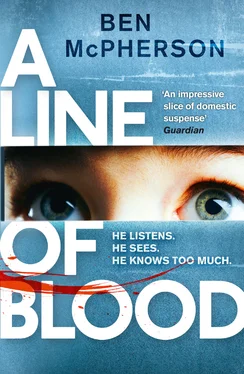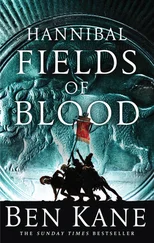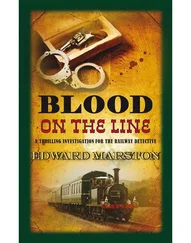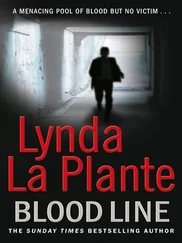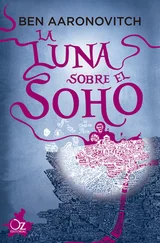Yes, we swore in front of Max, and yes, we smoked behind his back. That doesn’t matter. What matters is this – my wife, my son, the water and the laughter.
My little tribe.
Max let me hold his hand until we neared the school, then slipped his fingers from mine, walked beside me. On the final approach, he half-ran, putting ground between himself and me, anxious not to be seen arriving with a parent.
Millicent rang. I cradled the phone to my ear. Screams and shouts of morning break, six hundred London children giving voice.
‘I was worried.’
‘Hey. Sorry.’ Her voice was strained.
‘Where are you?’
‘On my way. You at the school?’
‘Yes.’
‘Wait for me?’
‘I’d hoped to speak to him before they go in again.’
‘You’ve forgotten his name again, haven’t you?’ Her voice softened.
‘I know. Bad Dad.’
‘So, you going to wait for me, Bad Dad?’
‘OK. All right.’
I saw Max in a dissolute huddle of boys, all oversized shirts and falling-down trousers. I caught his eye and pointed to the school building. ‘See you in there,’ I mouthed. He nodded and turned away.
Millicent arrived five minutes after the school bell. She was pale, the contours of her face shifted by lack of sleep. She reached up and kissed me.
Even in heels, Millicent was short. When we’d first met, it had made me want to protect her. Now I hardly noticed. I held her, grateful that she was there. She held me just as tightly. Then she ended the embrace by tapping me on the back.
‘Where’ve you been?’ I said.
‘Out. Thinking. Sorry.’
It’s been like this since we lost Sarah. Millicent’s reaction – her ultimate reaction, after she had fallen apart – was to do the opposite of falling apart. She reconstructed herself. She became supercompetent. Make your play, she writes, then move on. Play and move on.
The classroom looked like a post-war public information film, but with more black and brown faces. Didactic posters covered the walls. The children sat in orderly rows, working in twos from textbooks. Three rows back sat Max with his friend Tarek. He looked up when we entered, but didn’t acknowledge us.
Mr Sharpe too looked like a man from another age. Dark-skinned, and with close-cropped hair, dressed in a faultlessly pressed suit: like a black country schoolmaster from a time when no country schoolmaster was black. His hair was brilliantine slick, his moustache pencil thin, his hands delicate and agile.
‘May we speak with you?’ Millicent said. ‘We’re Max’s parents. We wanted to explain the reason for his lateness.’
‘Of course.’
‘In private.’ She turned towards the corridor.
‘Actually, that isn’t really appropriate.’ He gestured towards the class. I looked around, and found Tarek and Max looking directly at me. Tarek whispered something to Max; they looked at the teacher and at us, and laughed.
‘Unless, of course, you can wait until lunch break. Twelve fifteen. Here.’
‘We’d like Max to be present.’
Mr Sharpe nodded, waved us from the room and closed the door behind us.
‘Uh huh,’ said Millicent. ‘That sure went well.’
We bought bad coffee from a bad café, drank it from bad Styrofoam cups on a low wall on the baddest of Crappy’s bad streets. I lit a cigarette, and we shared it like the bad boy and bad girl we weren’t and never would be.
Millicent inhaled deeply, holding back some of the smoke inside her mouth, catching it as it started to wisp upwards, then sucking it hungrily down into her primed lungs. Two hits in one draw: proper film noir smoking. Even after thirteen years of marriage it suggested something unknowable, some glamorous secret that I was never quite party to.
‘What is it, Alex?’
‘You. Smoking in the sun. Hello.’
That same image – Millicent, backlight and smoke. It repeats itself sometimes, and it catches me off guard. It’s no more than a sliver of who she is, a reminder of a moment before we began to share our imperfections with each other. The American girl I met in the pub.
‘So,’ said Millicent, ‘the radio thing.’
‘I’m sorry. I should have listened to it.’
‘No, I kind of get why you couldn’t do that, Alex.’ She laughed gently. ‘I really did not see that one coming.’
I laughed too, then stopped, brought up short by the flash frame of the neighbour that cut hard into my thoughts: the broken body in its broken bathtub, the blooded eye cold against the London heat. Water falling through space.
Three frames of the wrong kind of reality.
‘What is it, Alex, honey?’
Erase. Breathe.
‘Alex, are you OK?’
‘Yes,’ I said. Breathe.
Millicent looked concerned, put a hand on my arm.
‘I’m fine.’ I breathed.
‘You’re fine?’
‘I’m fine.’ I breathed again. ‘You said you didn’t suck, Millicent.’
‘No, I sucked a little, but I didn’t stink.’
‘They gave you flowers.’
‘It was an evening transmission. I guess they already bought them before the show.’
‘But they liked you. Come on .’
‘Yes.’ Her eyes shone. ‘Yes, I guess they did like me. Because also they gave me this. Look.’ From her bag she produced an envelope.
I took it from her.
‘Wow,’ I said. ‘A contract.’
‘A letter of engagement. They emailed it to me. At four thirty this morning.’
‘You can’t have sucked at all, Millicent.’
‘They’re on summer schedule. They need cover. Tuesdays eight to ten. Four weeks.’
‘Wow,’ I said again.
‘Yeah, wow,’ she said. ‘That’s good, right?’
‘It’s brilliant, and you know it.’
My America.
We sat grinning at each other on our low wall.
Manifest destiny.
The meeting with Mr Sharpe lasted ten minutes. Max spent the first five looking out of the classroom window. When I described my fear that what he had seen might have traumatised him, must have traumatised him, Max looked round at me, then at Mr Sharpe. Then he yawned and went back to looking out of the window.
Mr Sharpe listened closely. When I had nothing more to say, he sat, drumming his fingers lightly on his desk, looking from Millicent to me, and back again. He opened a notebook that had been lying on the desk.
‘So, Mrs … I’m sorry, Ms Weitzman.’
‘Millicent.’
‘Hmm. Quite so. You asked that Max be present at this meeting. May I ask why?’
‘You wanted to be here,’ I said, ‘didn’t you, Max-Man?’
‘Yes,’ said Max, still looking out of the window.
‘And why was that, Max?’ asked Mr Sharpe, closing his notebook and placing it carefully back on the desk.
‘I don’t know, Mr Sharpe.’
‘Do you have anything to add to what your father has told me?’
‘No, Mr Sharpe.’
‘All right, Max. Run along and join your friends, then.’
Max left the room, closing the classroom door with exaggerated care. Millicent and I exchanged a look. Run along? Still, there was something strangely comforting about this odd little man with his easy paternalism and his brilliantined hair.
Through the wired glass I saw Max linger for a moment, then he disappeared down the corridor.
‘So, Millicent and …’
‘Alex.’
‘Millicent and Alex. Quite. Max seems well-adjusted, well-parented, if I may use that expression. You may be sure that I shall keep an eye open for any sign of the trauma that concerns you.’
‘That’s most kind of you, Mr Sharpe,’ said Millicent.
‘Yes, thank you,’ I found myself saying. ‘Really very kind indeed.’ The man’s formality was catching.
Читать дальше
